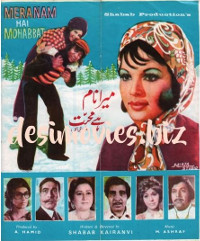Mera Naam Hai Mohabbat
| Mera Naam Hai Mohabbat میرا نام ہے محبت | |
|---|---|
 | |
| Directed by | Shabab Kiranwi |
| Screenplay by | Shabab Keranvi |
| Story by | Inspired by Love Story by Arthur Hiller |
| Produced by | A. Hameed |
| Starring | |
| Cinematography | Sadiq Moti |
| Music by | M Ashraf |
Release date |
|
| Country | Pakistan |
| Language | Urdu |
Mere Naam Hai Mohabaat (Urdu: میرا نام ہے محبت) is a 1975 Pakistani romantic drama film. The film's story is inspired by Love Story (1970), which in turn was based on the novel of the same name by Eric Segal.[1][2] It won the Nigar Award in 1975 for Best Film of the Year, with additional six awards in different categories. The film was also released in China and became successful there.[3]
Babra Sharif rose to become one of the most popular actresses of Pakistani cinema for almost two decades following the success of this film.[4]
Plot summary
This film is a story of a sad romantic girl who has cancer. She tries to hide this from her lover. Her family is unaware of this problem also. The lovers are very idealistic and truly in love with each other and this film also has a tragic end just like Love Story (1970).
Cast
- Babra Sharif[5][6]
- Ghulam Mohiuddin[5][6]
- Zarqa
- Bahar Begum[5]
- Tamanna
- Rehan
- Farzana
- Allauddin[5]
- Masood Akhtar
- Inayat Anjum
Production
The film's plot was reportedly inspired by a Chinese folk story.[3]
Mera Naam Hai Mohabbat introduced two new faces to the Pakistani silver screen, actor Ghulam Mohiuddin and actress Babra Sharif, propelling them into stardom due to the box-office success of this film.
Awards
Mera Naam Hai Mohabbat received 7 Nigar Awards in 1975 in the following categories.[7][8]
| Category | Awardee |
|---|---|
| Best Film | Mera Naam Hai Mohabbat |
| Best Director | Shabab Kiranvi |
| Best Script | Shabab Kiranvi |
| Best Music | M. Ashraf |
| Best Editor | Javed Tahir |
| Special Award | Babra Sharif |
| Special Award | Ghulam Mohiuddin |
Soundtrack
- Milte julte rahiye ga, Aankh mili hai Mehdi Hassan
- Aage tum peechhe ham, jao ge kahan Ahmad Rushdi
- Pyasa Kunwen kay paas aata hay Mehdi Hassan
- Yeh Duniya rahe na rahe mere hamdam Naheed Akhtar and Mehdi Hassan[6]
- Phoolon ko dekh dekh kay sharma rahay hain aap Mehdi Hassan
- Tujhe pyar karte karte meri umar beet jaye Mehdi Hassan[6]
- Tujhe pyar karte karte meri umar beet jaye Naheed Akhtar
- Yeh Duniya rahay na rahay mere Hamdam (sad) Mehdi Hassan[6]
Box office
Mera Naam Hai Mohabbat was a box office success in Pakistan.
Overseas in China, it released in 1981, following the success of Indian Bollywood films such as Awaara, Noorie and Caravan in the last several years. Mera Naam Hai Mohabbat became the highest-grossing foreign film of 1981, selling nearly 60 million tickets in China. At an average ticket price of CN¥0.2,[9] the film grossed an estimated CN¥12 million, equivalent to $7.1 million[10] (Rs. 70 million).[11] Adjusted for inflation, this is equivalent to $24 million (Rs. 3.3 billion).
References
- ^ The Statesman. Vol. 21. Mohammad Owais. 1975.
- ^ Mohammad Owais (1975). Mera Naam Hai Mohabbat (1975 film). p. 16.
- ^ a b "Ghulam Mohiuddin - An icon of golden era of Pakistani Cinema". SBS Urdu. 13 December 2015. Archived from the original on 2 March 2017. Retrieved 3 July 2019.
- ^ Smokers' Corner: The crying game (film review of Mera Naam Hai Mohabbat) Dawn (newspaper), Published 22 July 2012, Retrieved 23 March 2022
- ^ a b c d "Mera Naam Hai Mohabbat (1975 film)". Complete Index To World Film (CITWF) website. 8 December 2015. Archived from the original on 18 February 2020. Retrieved 23 March 2022.
- ^ a b c d e "Mera Naam Hai Mohabbat (1975 film)". Pakistan Film Magazine website. 15 June 2017. Archived from the original on 15 June 2017. Retrieved 22 April 2022.
- ^ "THE NIGAR AWARDS 1957 - 1971". The Hot Spot. Archived from the original on 3 August 2008.
- ^ "Pakistan's "Oscars"; The Nigar Awards". Desi Movies Reviews. Archived from the original on 13 June 2020. Retrieved 31 March 2023.
- ^ Link, Perry (2000). The Uses of Literature: Life in the Socialist Chinese Literary System. Princeton University Press. p. 204. ISBN 9780691001982.
- ^ "Official exchange rate (CNY per US$, period average)". World Bank. 1981. Retrieved 7 February 2019.
- ^ "Official exchange rate (INR per US$, period average)". World Bank. 1981. Retrieved 8 February 2019.
